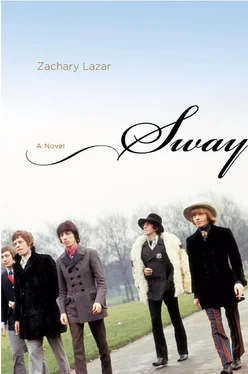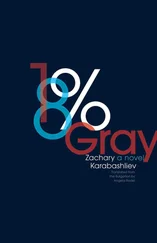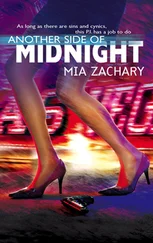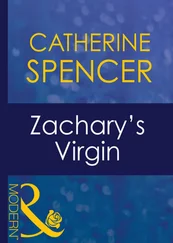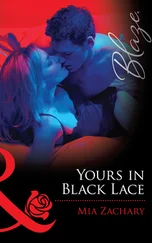More and more, both he and the world around him seemed on the verge of a breaking point. He could feel suppressed hostility running like an invisible current through the city’s televisions and the flickering lights of its subway cars. If it wasn’t the fear of Communists, it was the fear of Negroes. If it wasn’t the race to blow up the world, it was the race to send dogs or monkeys to the moon.
There were nights when it was too hot to sleep in the metal shed, and so he would spread one of his sheets out over the asphalt roof and look across the moonlit river to the speckled towers of Manhattan. He had friends there, and there were circles of people who knew his work and screened his films and had him over to their apartments for dinner. Afterward, he would sometimes go in search of boys, lost drifters in denim jackets or mechanic’s clothes, Lucifers, he called them, like so many avatars of his teenage crush, Ted Drake. They were mostly straight kids, hungry for a steak dinner, young enough to think of him as old, not fooled for a minute into thinking he was anything like them. When he got them alone, they were often as passive as ghosts, but sometimes there was a muscular scorn that brought him into contact with the real thing — a clenched fist at the end of a forearm, the edges of a ring abrading the bones of his back. What mattered was the first flash of desire, that almost nonexistent few moments when you could confront someone purely as a body and perhaps be confronted yourself in the same way, divorced from the dull facts of who you were. After that, things could only be tedious — two men talking to each other like ironic girls.
He believed that his films were lasting works of art, but perhaps this idea was evasive. Perhaps it was a way to justify being thirty-five and living in a metal shed on someone else’s roof.
He presented himself to the boys with the motorcycles as a camera enthusiast, a solemn man in his thirties who despite his whispery voice seemed to know something about tools. He bought them beer, and over the course of the next few days he filmed them as they moved in a crouch around the concrete floors of their garages, smoking cigarettes as they turned the wrench on a crankshaft or fitted a gas tank back into its slot. He filmed their gearboxes and sprockets, the pages of their repair manuals, the red taillights and chains and batteries laid out on the gray tarpaulin in the garage’s dark corner. None of them did well under the camera’s gaze for more than a minute or two. Being watched changed them, made them self-conscious. It got him thinking about the wavering line between fakery and authenticity, the way a dangerous pose sets up the expectation for actual danger.
Because what was a motorcycle for, if not to flirt with the crash? And what was the point of all that tangible speed, if not to outrace age and move directly to the end?
He didn’t remember where he’d come across the word “thanatomania.” When he looked it up in the Gances’ dictionary it wasn’t there, but he couldn’t help thinking that this word held the key to whatever it was he was sensing all around him. The vague restlessness seemed to have its source in some unspoken, half-yearning fascination with death. It didn’t escape him that those boys with their motorcycles made a perfect tableau of aggression and indifference. Their bikes, fitted with neat round mirrors on either side of the crossbars, were just like the spartan racing bikes that Jean Cocteau had chosen for the minions of the underworld in his film Orpheus .
About a week after he’d filmed the bikers, he met a thirty-one-year-old hustler named Bruce Byron outside a movie theater in Times Square. Byron wore a cowboy hat and a denim jacket that made him look rangier and younger than he was. He was good-looking in a blue-collar way. But it didn’t matter, since Anger was in that state of obsession now where everything he saw or heard became related to what he was working on and immediately found its rightful place. When he mentioned the biker movie, the response was silence: Bruce Byron squinting off into the distance, his eyes shadowed by the bent brim of his hat, his cheap boots creaking above the hot sheen of the sidewalk.
“I don’t have a lot of time,” said Anger.
“Maybe I’d be interested,” said Byron. He was still looking off down the street, lightly drumming his fingers on the edge of his thigh.
“Why don’t you give me your phone number?” said Anger. “I’ll call you later.”
“I don’t know about the phone.”
Perhaps part of the problem was that Anger had a mild crush on him. Perhaps he couldn’t quite forgive Bruce Byron for the matter-of-fact perfection of his ears, the stubbled contours of his chin, the way his small eyes focused so tightly on whatever they were trying to decipher.
A few days later, they met at Byron’s apartment, a walk-up on Tenth Avenue with red curtains patterned with silver snowflakes that were somehow strangely futuristic. Atop the television was a picture of a woman who might have been Byron’s sister, a comb in her brown bouffant, rheumy eyes that peeled down a little too far at the bottoms, like certain dogs’. Anger began setting up lights in the corners of the apartment’s only room, training them on a sagging bed with a loud scarlet coverlet. He had brought along two shopping bags full of props: leather jackets, engineer’s boots, a plastic skull, several posters, ashtrays, doilies, and commemorative plates emblazoned with the faces of Marlon Brando and James Dean. He arranged this paraphernalia around the room, replacing the decorative prints of Hawaiian beach scenes and the Golden Gate Bridge. This décor suddenly made more sense when Byron picked up the photograph of the woman on the TV and mentioned that she was his wife.
“I didn’t know you were married,” said Anger.
“No, there’s a lot you don’t know.”
“She’s at work?”
“She stays with her mother sometimes. In Queens. Debbie’s all right, except when she’s not all right, you know what I mean?”
They had both taken a hit of speed. Anger was already prepared to start, his light meter in his hand, but Byron was standing contemplatively in his denim jacket and cowboy hat, stretching his arms in a bridge before his chest. He seemed to be getting himself into character, which made no sense as Anger had given him no indication at all about what his role involved. He asked Byron to take off his hat. Then he asked him to strip down to his undershirt and lie on the bed in front of the TV, maybe with a pair of sunglasses on, maybe with a cigarette behind his ear.
“I don’t see what that has to do with the motorcycle idea,” said Byron.
“We’re not there yet. Just wait.”
“You want me to watch television?”
“Just for a minute. Everyone does it differently. I want to see how you do it.”
“You’re going to film this?”
“I think you should take off your jacket at least. Obviously the hat.”
Byron frowned and lit a cigarette. “I’ve always considered it an idiot box,” he said. “If I was bored I might put it on. While I was reading.”
“Look,” said Anger. “You need to relax. You need to stop thinking about everything so much.”
There was something like suppressed sarcasm in the sullen way Byron finally started unbuttoning his denim jacket. He gave a kind of silent chuckle, squinting as the smoke rose from the cigarette in his mouth. It seemed possible that this was the look he gave everyone just before he finally gave them what they wanted.
“She watches that thing day and night sometimes,” he said, raising his chin at the television.
“Who?” said Anger.
“My wife. Debbie. If it was up to me, I’d smash it. Throw it out the window.”
Читать дальше
